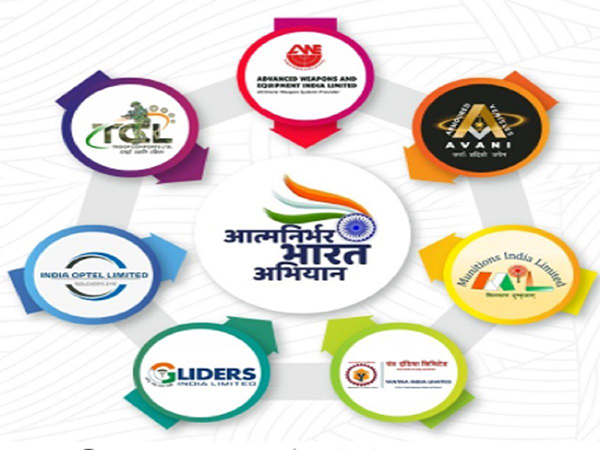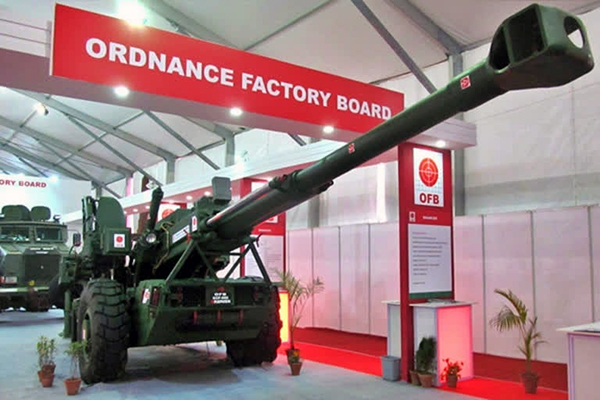The defence ministry has dissolved the Ordnance Factory Board (OFB) with effect from October 1 and transferred its assets, employees and management to seven public sector units (PSUs), according to an official order.
In an order dated September 28, the defence ministry said: Government of India has decided to transfer, with effect from October 1, 2021, the management, control, operations and maintenance of these 41 production units and identified non-production units to seven government companies (wholly owned by the government of India).
According to the order, the name of the seven defence PSUs (also called DPSUs) are:
- Munitions India Limited.
- Armoured Vehicles Nigam Limited.
- Advanced Weapons and Equipment India Limited.
- Troop Comforts Limited.
- Yantra India Limited.
- India Optel Limited.
- Gliders India Limited.
The OFB is currently a defence ministry entity and supplies critical arms and ammunition to the three armed forces and the paramilitary.
As part of the “Atmanirbhar Bharat” (self-reliant India) package, the central government had announced, on 16 May 2020, that it would improve autonomy, accountability and efficiency in ordnance supplies by corporatisation of the OFB.
Prime Minister’s Message
In a video address, on 1 October, to dedicate seven new defence companies to the nation, Prime Minister Narendra Modi, referring to the self-reliant India campaign, said the goal is to make the country the world’s biggest military power on its own.
He mentioned that the target should be that the companies not only establish expertise in their products but also become global brands. He urged that while competitive cost is India’s strength, quality and reliability should be its identity.
He said the world saw the strength of India’s ordnance factories at the time of World War I and that they used to have better resources and world-class skills, but the companies were ignored in the post-Independence period, leading to the country’s dependence on foreign supplies.
“After Independence, we needed to upgrade these factories, adopt new-age technology. But it was not given much attention. Over time, India became dependent on foreign countries for its strategic needs. These new seven defence companies will play a big role in bringing change in this situation,” he said in his video address.
“Today, there is more transparency, trust, and technology-driven approach in the defence sector of the country than ever before. For the first time after Independence, so many major reforms are happening in our defence sector and instead of stagnant policies, a single-window system has been arranged,” he said.
“These seven defence companies will play a major role in changing this situation,” he said.
The prime minister hoped that the new companies would play an important role in import substitution. An order book of more than Rs 65,000 crore reflects the increasing confidence of the country in these companies, he added.
Noting that the decision on reform of the OFB was pending for the last 15-20 years, Modi said works stuck for decades are being completed and India is taking new resolutions to build a new future. “In the 21st century, whether a country or a company, its growth and brand value is determined by its research and innovation. From software to the space sector, India’s growth, India’s new identity is the biggest example of this,” he said.
“Therefore, I also make a special request to all the seven companies that research and innovation should be a part of your work culture….You not only have to match the world’s biggest companies, but also take the lead in future technology,” he added.
Modi said the government has given full functional autonomy along with giving a better production environment to all the companies, adding it has also been ensured that the interests of the workers of these factories are fully protected.
Service Conditions
Defence Minister Rajnath Singh and representatives from the defence industry associations were present on the occasion. Singh has already clarified that there will be no change in service conditions of nearly 70,000 employees of the erstwhile organisation and the decision to corporatise the OFB is driven by efforts to boost India’s defence manufacturing sector.
Each of the new DPSUs is required to frame rules and regulations related to service conditions of the absorbed employees, the order noted.
Each of the DPSUs should also seek an option for permanent absorption from the employees on deemed deputation to that respective DPSU, within a period of two years, it stated.
The service conditions of the absorbed employees would not be inferior to the existing ones. A committee would be constituted by DDP (Department of Defence Production) for guiding the new DPSUs in this regard so that the absorption package given is attractive, the order mentioned.
All the employees of OFB (Groups A, B, and C), belonging to the production units and also the identified non-production units, are to be transferred en masse to the new DPSUs on terms of foreign service. They will, however, not be provided with any deputation allowance (deemed deputation) initially for a period of two years from the appointed date, an official order stated.
The MoD has set a target of achieving a turnover of Rs 1,75,000 crore in aerospace and defence goods and services by 2024. This includes exports worth Rs 35,000 crore. The new companies will take over the existing OFB orders to the tune of Rs 65,000 crore.



















